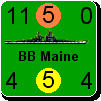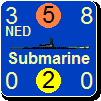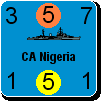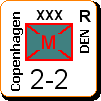Red Prince
Posts: 3686
Joined: 4/8/2011
From: Bangor, Maine, USA
Status: offline

|
Just another follow-up on the chit pool composition in 1939, here are the chances of pulling a chit with each value:
0 - 1.7%
1 - 30.2%
2 - 24.9%
3 - 21.1%
4 - 20.9%
5 - 1.3%
So, for the initial draw, there was a 42% chance that each of the 3 starting chits would be a 3 or a 4. The expected starting chits should on average, have been worth 2.33 each, or a total value of 7. In this game, the average was 3.66, totaling 11. However, given the chit distribution, the chances of pulling 2 chits with a value of 2, and 1 chit valued at 3 (averaging 2.33) are almost the same as drawing 2 chits with a value of 4, and 1 chit valued at 3 (averaging 3.66). For each chit, there is a 1 in 4 chance of drawing a 2, and 1 in 5 chance of drawing a 4 (roughly). That's roughly the same chances.
quote:
ORIGINAL: Red Prince
Here's a summary of what "could" have happened with chit draws:
Red means a chit could have been added.
Blue means a chit could have been removed.
Purple means a chit was to be added, without a roll.
New Game for 09.02.05
US Entry Markers:
2 to Ge/It Pool: (2238 [4], 2075 [3])
1 to Ja Pool: (2688 [4])
For each of the other chit draws, I'll now add in the chance of drawing a chit in the first place.
quote:
Impulse: 1
120% Germany DOW Poland (CW); USE-8 (+1 chit, 2345 [3])
30% Japan aligned Siam; USE-1 (+1 chit, 2698 [4]
20% Japan entered Ichang; USE-1 (+1 chit, 1279 [2])
30% And you're not going to believe this . . . taking Changsha: USE-1 (+1 chit, 32 [0])
Impulse: 2
120% CW DOW Germany; USE-8 (-1 chit, 2 of 3 [3])
Impulse: 3
70% Italy DOW France; USE-7 (+1 chit, 751 [1])
30% Germany DOW Denmark (CW); USE-8 (no chit)
30% Germany DOW Netherlands (CW); USE-8 (no chit)
30% Germany DOW Hungary (CW); USE-10 (no chit)
20% Japan moves its MAR Division into Pakhoi, then on to Nanning; USE-6 (no chit)
Impulse: 4
90% USSR DOW Persia (Ja); USE-1 (-1 chit, 1 of 3 [1])
70% USSR moves the CAV from Minsk to the forest SW of Vilna; USE-8 (no chit)
Impulse: 5
70% Italy DOW CW; USE-3 (+1 chit, 2898 [4])
80% Germany DOW Belgium (CW); USE-6 (+1 chit, 770 [1])
Impulse: 9
20% . . . including taking Nanyang with MOT; USE-9 (no chit)
20% Attack on Chengchow: Assault, Fractional Odds .509 (No); Roll = 8 = */2S; USE-7 (no chit)
So, and I'm really not sure I understand how this works, but you would expect the total number of chits drawn to be 2.9 in addition to the original 3. Add in the final draw at the end of the turn (below), and you get 6.9 chits that should be in the Entry and Tension Pools in the final tally. (Did I calculate that correctly?)
Let's call it 7 chits, because I believe in 6.9 chits as much as I believe in the "average American family" having 2.4 kids and half of a dog. I've never see a family with exactly 2.4 kids, and I'll never see the pools have exactly 6.9 chits. So, let us say we should expect to see 7 chits in the pools.
The 7 chits should total 16.31 in value (I'll deal with partial value, but not partial chits). Reality has 9 chits in the pools, with a total value of 27, which averages out (quite neatly) to 3 per chit. So, reality shows the Axis was unlucky by about 2 chit draws and a deviation of +.67 per chit.
Now, let's see where that unluckiness happened:
quote:
End of Turn:
USA drew 1 marker to the Ja Entry Pool (3003 [5])
-----
As you can see, the Mandatory chits totaled 4 (3, 4, 4, 5)
This 4 chits total 16 in value, with a deviation of +1.67, completely beyond Axis control.
quote:
The possible additions to the Entry Pools went 7 out of 13 (0, 1, 1, 2, 3, 4, 4)
Here we would have expected 5.7 chits, so the Axis was unlucky by 1.3 chits drawn. The 7 chits, though, total 15, averaging 2.14, which is a deviation of -.19, or about what you would expect. The bad luck here is in the extra chits drawn.
quote:
The possible removals from the Entry Pools went 2 of 3 (1, 3)
And, finally, you would expect 2.8 chits to have been removed, which accounts for the rest of the Axis "bad luck". The 2 chits removed total 4, average 2, which is a deviation of -.33 (which, in this case favors the Allies).
All I can really say about this, is that the Axis play was aggressive, but everything within its control came out roughly as expected, with the exception of an additional chit (forget the .3) Everything outside direct Axis control ran in favor of the Allies. Here we add the .3 to the .8 to get a chit that "should" have been removed, and the deviations obviously favored the Allies.
So, can the Axis play really be described as "not how to play the Axis" given the fact that the Axis technically doesn't know what is in the pools? If the expected chit values are used instead of the actual values, at the end of the turn, the Axis would estimate the following numbers before any Options are chosen (actual numbers in parentheses):
Ge/It chit value: 9.32 (12)
Ja chit value: 11.65 (15)
Ge/It Entry Level: 19.8 (25.5)
Ja Entry Level: 22.14 (28.5)
And, after each Entry Pool moved an "expected value" chit of 2.33 to the Tension Pools:
Ge/It Entry chit value: 6.99 (9)
Ge/It Tension chit value: 2.33 (3)
Ja Entry chit value: 9.32 (11)
Ja Tension chit value: 2.33 (4)
Ge/It Entry Level: 15.15 (19)
Ge/It Tension Level: 4.66 (7)
Ja Entry Level: 17.48 (21)
Ja Tension Level: 4.66 (8)
Having little experience with as many games as some of you have seen/played, are the numbers the Axis would have "estimated" still extremely high for S/O '39? If so, then I suppose you could make a case for the Axis having played foolishly. But remember, there are still 2 chits in the pools that could not have been "expected" based on how the Axis played. Assume that one chit comes out of each Entry Pool (USSR failure to remove one for taking E. Poland for the Ge/It; an extra chit for taking a Chinese city for Ja), and here's what the Axis play should have produced:
Ge/It Entry chit value: 4.66 (9)
Ge/It Tension chit value: 2.33 (3)
Ja Entry chit value: 6.99 (11)
Ja Tension chit value: 2.33 (4)
Ge/It Entry Level: 10.49 (19)
Ge/It Tension Level: 4.66 (7)
Ja Entry Level: 12.82 (21)
Ja Tension Level: 4.66 (8)
Now, if you look at the last actions that the Axis took to actually add a chit to each pool, you find the German DOW on Belgium in Impulse #5, which may have been questionable, but you have to go all the way back to Impulse #1 to find the problem in the Japanese strategy. In that case, you would expect .8 chits to be added to the Ja Entry Pool. Instead, you get 3 straight rolls of '1' and add 3 chits. That's just bad luck, if you ask me. If even one of those hadn't produced a chit, and if the occupation of E. Poland had removed a chit (as it does 70% of the time), the Axis could reasonably have expected the numbers listed immediately above.
So, I ask again, was the Axis play really so aggressive as to be defined as "how not to play the Axis"? Or was it just the luck of the draw -- quite literally -- on the part of the Allies?
I'm not putting this all together as a defense of my gameplay. I'm really curious, because all of us have had information that the Axis would not have in an actual game -- the actual running totals for the US Entry Pools. (If I have screwed up my math anywhere, please let me know, since it might invalidate my entire set of arguments).
Thoughts, anyone?
-----
Edit: Having said all of this, the fact that the US was able choose to Relocate the fleet to Pearl Harbor should scare the pants off the Axis at this point, changing their behavior quite a bit. On the other hand, the damage has already been done. It might be wise to hold off for a turn before making any more DOWs, of course (particularly on Greece), since in 1940 there is a 55% chance of a 0 or 1 for each chit drawn. The only problem with that is that, particularly in China, the Axis needs to take advantage of its present position. The DOW on Greece can probably wait until 1940, but Japan needs to keep the pressure on China at a very high level. That might mean taking additional cities in N/D '39, if it seems possible to isolate a lot of units.
On the German side of things, if Vichy is going to be the choice, getting that done in '39 could be a devestating blow to the Allies. France is still very weak and vulnerable (yeah, that's the CW's fault, I know) and good weather in N/D '39 could see Paris fall. How much should this impact the Axis strategy vs. the risk of higher chit draws? I don't really know.
< Message edited by Red Prince -- 11/22/2011 1:14:09 PM >
_____________________________
Always listen to experts. They'll tell you what can't be done and why. Then do it!
-Lazarus Long, RAH
|
 Printable Version
Printable Version

 )
) 









 ) in N/D '39, France might not even make it to 1940 if Vichy does get declared. If that choice is made, closing the Med might be right out the window, and Germany could well be in position to tranfer its troops back to Poland for a Summer '40 Barbarossa, which would be devastating for the USSR. If that means the Soviets can also be eliminated, it may not matter how strong the USA is or how early they enter the war. The same applies to Japan having a chance at taking China out of the game. If either or both of these happen, the USA and CW will still be hard-pressed to come back in force. While waiting for the inevitable invasions, Germany and Italy could still try closing the Med . . . just a little later than planned.
) in N/D '39, France might not even make it to 1940 if Vichy does get declared. If that choice is made, closing the Med might be right out the window, and Germany could well be in position to tranfer its troops back to Poland for a Summer '40 Barbarossa, which would be devastating for the USSR. If that means the Soviets can also be eliminated, it may not matter how strong the USA is or how early they enter the war. The same applies to Japan having a chance at taking China out of the game. If either or both of these happen, the USA and CW will still be hard-pressed to come back in force. While waiting for the inevitable invasions, Germany and Italy could still try closing the Med . . . just a little later than planned. 






 ) closed in on the last two targets in the hex and struck them hard!
) closed in on the last two targets in the hex and struck them hard! 




 And the shock of the French public will he huge... Not good for morale at all...
And the shock of the French public will he huge... Not good for morale at all...  . That GAR is going to get killed without any German losses at all.
. That GAR is going to get killed without any German losses at all.  . Don't worry about the Italians at this point. They haven't got any punch to get at you. Only German units can do so in the Alps, since you're doubled on defense.
. Don't worry about the Italians at this point. They haven't got any punch to get at you. Only German units can do so in the Alps, since you're doubled on defense.  New Messages
New Messages No New Messages
No New Messages Hot Topic w/ New Messages
Hot Topic w/ New Messages Hot Topic w/o New Messages
Hot Topic w/o New Messages Locked w/ New Messages
Locked w/ New Messages Locked w/o New Messages
Locked w/o New Messages Post New Thread
Post New Thread